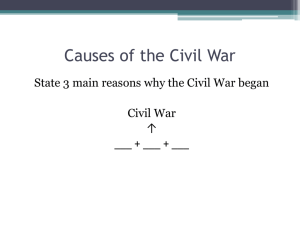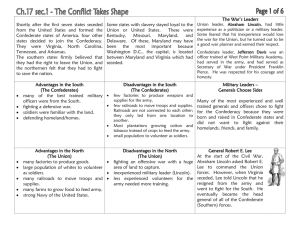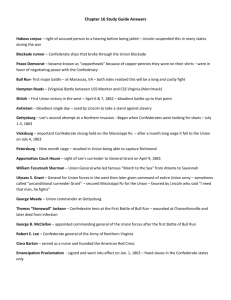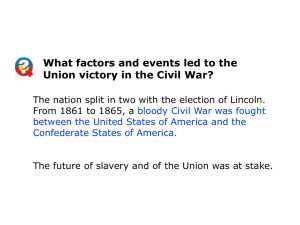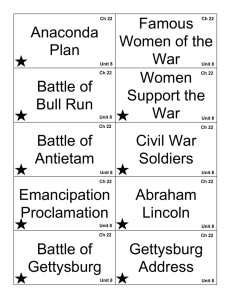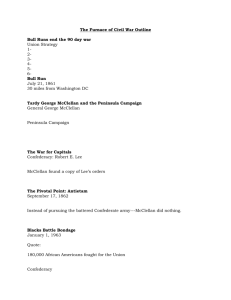Chapter 15 Secession and the Civil War 1861-1865
advertisement
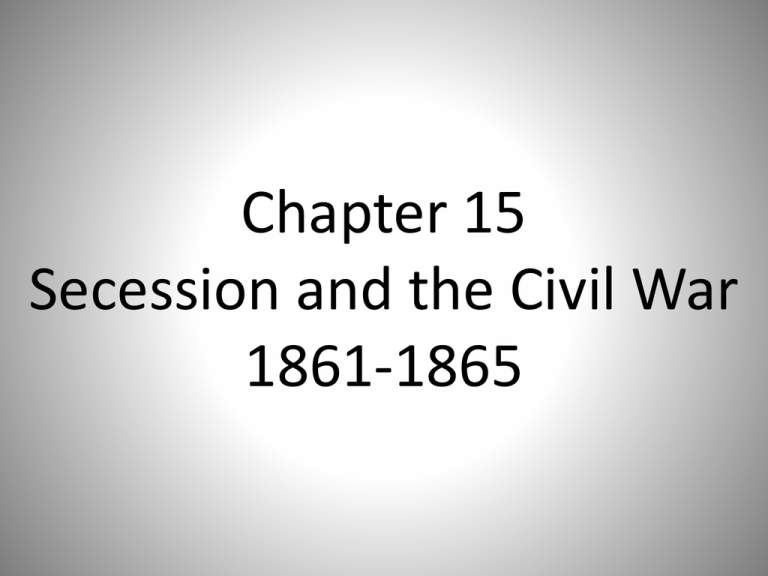
Chapter 15 Secession and the Civil War 1861-1865 The Tide Turns • early 1863 the Confederate economy was in shambles and its diplomacy had collapsed • as slaves fled from plantations, more and more lowerclass whites deserted the army or refused to be drafted at all – some counties became “deserter havens” • the Appalachian mountaineers resisted the Confederacy more directly by enlisting in the Union army or joining guerrilla units • North was slow to capitalize on this advantage • had its own serious morale problems and war weariness to deal with – emancipation, which was popular with Republicans was viewed by most Democrats as a betrayal of northern war aims • Enrollment Act (March 1863) – provided for outright conscription of white males, but allowed those of wealth to hire substitutes or pay a fee to avoid military service – this provoked a violent response from those unable to buy their way out of service and a series of antidraft riots broke out – the New York Riot (July 1863) – made up of Irish-American laborers, burned the draft offices, the homes of leading Republicans, and an orphanage for black children • lynched more than a dozen defenseless blacks and at least 120 people were killed – reflected working class anger at the wartime privileges and prosperity of the middle and upper classes – showed how divided the North really was on how the Republicans were conducting the war • government used its martial law authority to arrest a few alleged ringleaders • used a barrage of propaganda aimed at what they believed was a vast secret conspiracy to undermine the northern war effort • Copperheads – were militant advocates of “peace at any price” – was their opposition to emancipation on racial grounds rather than anxiety about big government that gave the movement most of its emotional force • only way to stop these new movements was to start winning battles and convince the northern public that victory was assured • but, the North suffered one more humiliating defeat at Chancellorsville – Union forces under General Joseph Hooker were routed by a Confederate army less than half its size • The Battle of Chancellorsville – General Joseph “Fighting Joe” Hooker (Union) – Lee separates forces with General Jeb Stuart (cavalry command) – orders soldiers to build large fires at night, so the enemy does not realize most of the army is gone – Lee demonstrated his superior generalship by dividing his forces again with General Stonewall Jackson to make a surprise attack on the Union’s right flank – Hooker’s troops withdraw across the river, the Confederacy wins – Jackson dies (from wounds by his own soldiers who mistook him as the enemy) and deprives Lee of his “strong right arm” Scene from “Gods and Generals” • General Ulysses S. Grant – had been trying to capture Vicksburg, Mississippi – the almost inaccessible Confederate bastion between the North and control of the mighty river – in a bold campaign, Grant crossed the river, cutting himself off from his supply line, and marched into the interior of Mississippi – his troops won a series of victories over two separate Confederate armies and advanced on Vicksburg from the east • Grant then settled in for a siege • President Davis approved Robert E. Lee’s plan for an allout invasion of the Northeast – might lead to a dramatic victory that would help to compensate for the probable loss of Vicksburg • Battle of Gettysburg – Lee confronted a Union army that had taken up strong defensive positions on Cemetery Ridge and Culp’s Hill • one of the few occasions in the war when the North could take advantage of choosing its ground and then defending it against an enemy whose supply lines were extended – a reversal from most other battles • a series of Confederate attacks failed to dislodge General George Meade’s troops • Lee faced the choice of retreating to protect his lines of communication or launching a final desperate assault – he chose to make a direct attack on the strongest part of the Union line – charge on Cemetery Ridge was disastrous – advancing Confederates dropped like flies under the barrage of Union artillery and rifle fire • July 1, 1863 – Confederates outnumbered Union forces – pushed Northerners back onto hills south of town – General George Meade (new Union general) arrived on the scene • had been in command less than a week – each group took position on a series of hills, lines stretching about four miles • Cemetery Ridge – center of the Union line • Seminary Ridge – center of the Confederate position – between the two was a large field – General James Longstreet Confederate, who replaced Jackson • advised Lee against attacking such a strong Union position • was ordered to attack the southern end of the Union line the next morning • July 2, 1863 – Longstreet had wanted to in charge of the Confederate army’s payroll, Lee made him a field commander • he was not ready to attack until 4:00 P.M. and his delays gave Meade the chance to bring in reinforcements – Devil’s Den – mass of boulders where fighting occurred – Little Round Top – undefended hill noticed by Alabama soldiers where if taken the Confederates could have bombarded the Union lines – Maine Soldiers – arrived on the hill first and fended off repeated attacks under Colonel Joshua Chamberlain • ran out of ammunition and took a bayonet charge against the Confederates, surprising them and forcing a retreat – Union lines would remain intact at day’s end • July 3, 1863 – 150 Confederate cannons begin the heaviest artillery barrage of the war – Lee decided to risk everything on an infantry charge at the center of the Union position • Longstreet opposed such a direct attack, Lee opposed him – Pickett’s Charge – reduced Confederate group from 15,000 men to a few hundred who actually reached the Union lines • Lee ordered Pickett to reform his line, worried about a counter-attack by Meade: “General Lee, I have no division.” – ended the bloodiest battle of the Civil War • Confederates retreat to Virginia • retreat was inevitable and Lee withdrew to the Potomac with his battered troops – the river was at flood stage and could not be crossed for several days – Meade failed to follow up his victory with a vigorous pursuit and Lee escaped • Vicksburg fell to Grant on July 4 – the same day Lee began his retreat and Northerners rejoiced at the simultaneous Independence Day victories that turned the tide of the war – Union had secured control of the Mississippi and had at last won a major battle in the East Last Stages of the Conflict • in the middle south, the main target was Chattanooga “the gateway to the Southeast” – General William Rosencrans managed to maneuver the Confederates out of the city, only to be outfought and driven back to Chickamauga – Union army then retreated into Chattanooga where it was surrounded and besieged by southern forces – Grant arrived from his victory at Vicksburg to take command – encirclement was broken by daring assaults on the Confederate positions on Lookout Mountain and Missionary Ridge • after Union success, the North was poised for an invasion of Georgia • Grant’s victories in the West earned him promotion to general in chief of all Union armies • he ordered a multipronged offensive to finish off the Confederacy – a march on Richmond under Grant’s personal command – thrust by the western armies, now led by General William Tecumseh Sherman, to Atlanta and the heart of Georgia • Grant and Lee began to meet in northern Virginia, fighting a series of battles – Lee would take up an entrenched position in the path of the invading force, Grant would attack it – Grant would sustain heavy losses, but inflict casualties on the shrinking Confederate army – Grant would move to his left, hoping to maneuver Lee into a less defensible position • Battle of the Wilderness – woods caught fire, causing confusion in the smokefilled forest – General Longstreet of the Confederacy – accidentally shot by his own soldiers, three miles from where Jackson was shot • Battles of the Wilderness, Spotsylvania, and Cold Harbor – Union lost about 60,000 men – more than twice that of the Confederates – without defeating Lee or opening the road to Richmond – soldiers began pinning their names and addresses to their uniforms so they would be identified if killed • Grant decided to change his tactics and moved his army to the south of Richmond • he came upon Petersburg and settled down for a siege • Siege of Petersburg – a long, drawn-out affair, the resulting stalemate in the East caused northern morale to plummet, in the critical election year of 1864 • Lincoln was confronted with growing opposition within his own party – especially from the Radicals who disagreed with his apparently lenient approach to the future restoration of the seceded states • Democrats – platform appeal to war weariness by calling for a cease-fire followed by negotiations to re-establish the Union – nominee was George McClellan • he wanted to pursue the war, but promised to end the conflict sooner than Lincoln could because he would not require emancipation as a condition for reconstruction The Election of 1864 Candidate Party Popular Vote Electoral Vote Lincoln Republican 2,218,388 212 McClellan Democratic 1,812,807 21 • northern military successes changed the political arena • Sherman’s invasion of Georgia went well – used a skillful flanking movement to force the Confederates to retreat to the outskirts of Atlanta – the city fell, and northern forces occupied the hub of the Deep South • news unified the Republican party behind Lincoln and improved his chances for defeating McClellan – Republican cause of “liberty and Union” was secure • concluding military operations revealed the futility of further southern resistance • Sherman cut himself off from his supply lines and lived off the land in his march to the sea – marched unopposed through Georgia (wanted to “make Georgia howl”), destroyed almost everything of possible military or economic value in a three hundred mile long and sixty mile wide swath • destroyed bridges, factories, and railroad lines • seized and slaughtered livestock • Sherman’s Goals – destroy the South’s remaining resources – crush Southerner’s remaining will to fight • few houses were spared “War is cruelty. There is no use trying to reform it. The crueler it is, the sooner it will be over.” - General William Tecumseh Sherman • Confederate army under the command of General John B. Hood moved northward into Tennessee – was defeated and almost destroyed by Union forces under General George Thomas at Nashville • Sherman captured Savannah and presented the city to Lincoln as a Christmas present – turned north and carried his scorched-earth policy into South Carolina • aim was to eventually join up with Grant at Petersburg near Richmond • Grant finally ended the stalemate at Petersburg • Lee’s starving and exhausted army tried to break through the Union lines • Grant renewed his attack and forced the Confederates to abandon Petersburg and Richmond – pursued them westward for a hundred miles • were daily desertions in the Confederate army • Lee was hoping to unite his troops with Johnston’s; but was continually cut off by Grant’s troops – his soldiers suggested fighting as guerrillas (using surprise raids and hit-and-run tactics) • Union forces were positioned to cut off the Confederate line of retreat to the south • recognizing the hopelessness of further resistance, Lee surrendered at Appomattox Courthouse on April 9, 1865 • Appomattox Court House – Lee and Grant met in a private home in the town • Terms of Surrender – Southern soldiers can take their horses and mules and go home – not be punished as traitors as long as they obeyed the law – fed by Union troops before leaving – Grant orders all celebrations to end – “the rebels are our countrymen again” – Johnston surrenders to Sherman • joy of victory turned to sorrow and anger after John Wilkes Booth (a pro-Confederate actor) assassinated Abraham Lincoln as the president watched a play at Ford’s Theatre in Washington on April 14 – Lincoln himself had given “the last full measure of devotion” to the cause of “government of the people, by the people, for the people” • only remaining Confederate force of any significance laid down its arms four days later and the Union was saved • John Wilkes Booth – Maryland actor with strong Southern sympathies; met with a group plotting to kidnap the president for the release of Confederate POW’s • goes into Lincoln’s unguarded box in Ford’s Theatre and shoots the President in the head • he flees over the railing breaking his leg in the process and is eventually cornered in a barn where he dies • Lincoln – taken to a boarding house across the street, where he lingers through the night before dieing early the next morning – body was taken to his hometown in Springfield, Illinois Effects of the War • 618,000 young men were in their graves – victims of enemy fire or the diseases that spread rapidly in military encampments • widows and sweethearts they left behind temporarily increased the proportion of unmarried women in the population – involuntary “spinsters” who sought new opportunities for making a living or serving the community • northern women pushed the boundaries of their traditional roles by participating on the home front as fund-raisers and in the rear lines as army nurses and members of the Sanitary Commission – promoted health in the northern army’s camps through attention to cleanliness, nutrition, and medical care – created in June 1861, attempted to combat these problems • • • • • • dysentery typhoid fever malaria pneumonia mumps measles • Medical Care – one in four Civil War soldiers did not survive the war – doctors did not know how to sterilize their materials • Clara Barton – Union nurse, “angel of the battlefield” • would later found the American Red Cross • women filled key positions in the administration and organization of patriotic organizations – calls for broadening “the women’s sphere” • postwar philanthropic and reform movements • the efforts of women during the Civil War broadened beliefs about what women could accomplish outside of the home – a vivandiere gave a wounded or sick soldier immediate attention • white women in the Confederacy faced a different kind of war at home • coming of the war forced them to shoulder even greater burdens at home – the loss of fathers and brothers, the constant advance of Union troops, and the difficulty of controlling a slave labor force destroyed many southern women’s allegiance to the Confederate cause – faced the challenge of rebuilding a society that had been permanently transformed by the experience of war • devastation of the southern economy forced many women to play a more conspicuous public and economic role – forming associations to assist returning soldiers, entering the workforce as educators, and establishing numerous benevolent and reform societies or temperance organizations • the South would remain more conservative in its views about women’s “proper place” than in those in the North • nation had emancipated 4 million African Americans from slavery • had not resolved whether they would be equal citizens • Republican rhetoric stressing “equal opportunity” and the “dignity of labor” raised hopes that the crusade against slavery could be broadened into a movement to improve the lot of working people in general • so many immigrants had fought and died for the Union cause – this weakened nativist sentiment and encouraged ethnic tolerance • federal government was now supreme over the states – southern principle of state sovereignty and strict construction died at Appomattox • the U.S. was becoming a true nation-state with an effective central government – states could no longer claim the right to secede or nullify federal law, they did still have primary responsibility for most functions of government • questions would continue about where federal authority ended and states’ rights began • broadened definition of federal powers • Republican-dominated Congresses passed legislation designed to give stimulus and direction to the nation’s economic development • began a program of active support for business and agriculture • passed a high protective tariff, approved a homestead act to encourage settlement of the West, granted huge tracts of land to railroad companies for the construction of a transcontinental railroad, gave the states land for agricultural colleges • Congress set up a national banking system and authorized these banks to issue notes of currency – the country’s first standardized and reliable circulating currency • showed a decisive shift in the relationship between the federal government and private enterprise • encouraged an “organizational revolution” • venturesome businessmen took advantage of the new national market – developed more effective national associations • North won the war because it had shown a greater capacity than the South to organize, innovate, and “modernize” • began the great transformation of American society from an individualistic society of small producers into the more highly organized and “incorporated” America of the late 19th century
